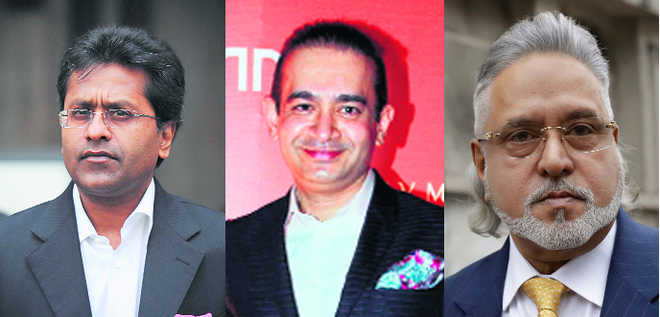Mythili Bhusnurmath
Economist and former central banker
Throughout the democratic world, elected governments have responded much the same way to instances of large-scale white collar crime: with new (hasty?) legislation to minimise, if not eliminate, the scope for recurrence of such crimes. Unfortunately, in their desire to be seen as doing something, often without much concern for the results, very little really changes on the ground. The public, however, is hoodwinked into believing that authorities have taken prompt action and some of their anger is deflected. Till the next crime surfaces!
Seen in this light, the Union Cabinet's approval of the Fugitive Economic Offenders' (FEO) Bill, 2017, covering economic offences with a value of Rs 100 crore or more, is very much a piece with the host of laws passed by the US in the aftermath of the Lehman Brothers crisis. Or the UK's response (as many as 80 pieces of legislation were passed!) to the collapse of Northern Rock and other blue chip banking names in the early days of the global financial crisis of 2008.
Our laws lack teeth
But there is a key difference. In the western world, laws have teeth, so fugitives, typically, fear the consequences. In contrast, many of our laws, while excellent on paper, are quite ineffective in practice.
Take the FEO Bill as it stands today. The Bill seeks to deter white collar crime by making it easier to attach the assets of economic offenders who flee the country to escape the long arm of the law. But we already have a multitude of laws such as PMLA (Prevention of Money Laundering Act), SARFAESI (Securisation and Reconstruction of Financial Assets and Enforcement of Security Interest) Act, Insolvency and Bankruptcy Code etc, to deal with white collar crime.
So why do need another law? Because the proposed law differs from existing laws in one crucial respect: it allows confiscation of assets of alleged fugitive economic offenders before (emphasis added) conviction. Worse, it disentitles the fugitive economic offender from any recourse under civil law. In contrast, existing laws allow confiscation only after (emphasis added) conviction (which can take years). Confiscation, moreover, is limited to the proceeds of the crime for which the conviction has been secured (by which time the value of the assets could have greatly eroded).
Flaws in fugitive Bill
It runs afoul of right to access to justice: Prima facie, these 'novel' provisions in the proposed Bill seem a great way of ensuring better and faster recovery. But they run afoul of one of the basic freedoms granted under the Constitution: No individual can be penalised without being convicted and no one can be denied access to justice; a principle that has been upheld many times by the courts, with the Constitution Bench of the Supreme Court in its landmark ruling of July 2016 clearly ruling that access to justice is 'a facet of right to life guaranteed under Article 21 of the Constitution.'
In practice, therefore, the Bill is unlikely to pass judicial scrutiny. It is based on a presumption of guilt, ie on the premise of 'guilty-till-proved-innocent' as against the basic premise in common law of 'innocent-until-proved-guilty'.
Catch in attachment of assets: Moreover, under the Bill, all assets, whether or not they have been offered as security for the loan, can be attached. The rationale, presumably, is to ensure enough assets are attached and sold while they have economic value; unlike at present, when the asset often becomes worthless by the time the case meanders to an end through our labyrinthian court processes.
But does that make it a good Bill? Not quite! Apart from the question of violation of Fundamental Rights, it goes against the raison de etre of modern joint stock companies, the concept of limited liability. Unlike proprietorships and partnerships, the distinguishing feature of a joint stock company and indeed its USP (unique selling proposition) is that it enables disparate investors to come together and pool their risk capital. But with a caveat: the clear understanding that in case the venture goes belly-up, for whatever reason, apart from any assets that might be held in the company's name, their loss will be limited to their share capital.
Indeed the very concept of 'promoter' is itself uniquely Indian and does not find resonance in developed countries. Take the case of a company like Unilever; does it have a promoter? No! The shareholding is diversified and widely-held. By doing away with this fine distinction and treating the assets of 'promoter' shareholders as distinct from other shareholders, the Bill strikes at the very root of one of the biggest innovations of modern capitalism and is, again, likely to be tested in a court of law. In addition, it is likely to act as a dampener on investment at a time when desperately-needed animal spirits are sadly lacking.
Despite these flaws, the Bill is likely to have an easy passage in the Lower House, thanks to the BJP enjoying a clear majority in the Lok Sabha. Indeed, given the public outrage over the Punjab National Bank fraud involving Nirav Modi and related companies, it may be passed without much demur in the Upper House as well.
This is unfortunate. Poor drafting combined with our tardy reputation in implementation means the Bill is unlikely to make any dent on white collar crime and, instead, meet the fate of many of our well-intended, but inadequately thought-through, statutes.
Unlock Exclusive Insights with The Tribune Premium
Take your experience further with Premium access.
Thought-provoking Opinions, Expert Analysis, In-depth Insights and other Member Only Benefits
Already a Member? Sign In Now











